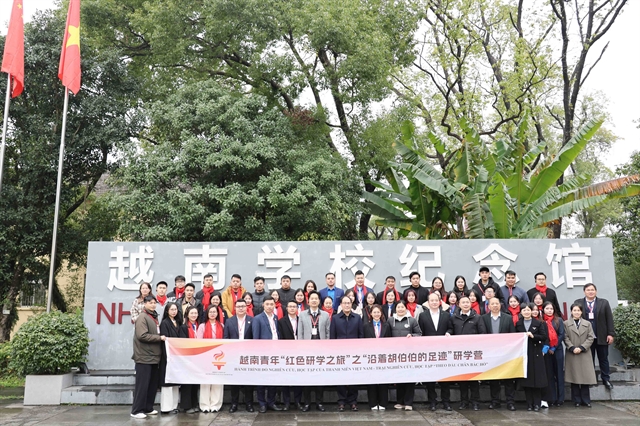 Op-Ed
Op-Ed

Aida Hadzialic became the youngest ever minister in the history of Sweden at the age of 27. Before taking office as the Minister for Upper Secondary School, Adult Education and Training in 2014, the talented, young woman who fluently speaks five languages already served as a deputy mayor of the city of Halmstad when she was only 23. Though having to resign following an alcohol limit breach while driving in August, Hadzialic basically represents a breeze of fresh air that every Vietnamese looks for in the Government filled with old men and women who seemed out of breathe catching up with the world moving too fast.
 |
Aida Hadzialic became the youngest ever minister in the history of Sweden at the age of 27. Before taking office as the Minister for Upper Secondary School, Adult Education and Training in 2014, the talented young woman who fluently speaks five languages had already served as a deputy mayor of the city of Halmstad when she was only 23.
Though she had to resign in August following an alcohol limit breach while driving, Hadzialic basically represents a breath of fresh air to many Vietnamese citizens who feel the governing system in the country teems with old men and women who seem out of breath as they try to catch up with a world moving very fast.
Now they have something that they’ve wished for. Just 26, Vũ Huy Hoàng has been appointed deputy head of the Economic Department of the Steering Committee for the Southwest region (SCSW).
The position is a remarkable achievement for someone as young as Hoàng in Việt Nam, and even more so given that the Steering Committee, under direct control of the Communist Party, is at the helm of the entire southwest border region. There were only three steering committees of its kind in the country. The other two oversee the border regions of the Central Highlands and the northwest.
In some respects, Hoàng has a more impressive educational background than former Minister Hadzialic.
Apart from knowing five languages (Vietnamese, English, Chinese, Japanese and Spanish), he graduated with honours from two Masters courses from the University of Kent and the Tsinghua University, and is pursuing a PhD in the University of Tokyo at present.
Clearly a very talented, brilliant young man.
Opponents of Hoàng’s appointment have been accused by many people of being bigots, denying young people a chance to devote their talents for the country.
The young man has a much better educational background than most officials, even those at very high levels, and is therefore completely capable of being a deputy head instead of starting a political career from scratch, supporters of the appointment have argued.
Let’s try to be objective here.
Any young talent who wishes to work for the Government, motivated by a desire to work for the greater good deserves respect and admiration. This is true particularly of obviously talented and qualified people who are giving up more economically lucrative careers for working as a public servant.
And if such people prove to have leadership qualities, they can even be appointed to ministerial positions. I don’t think anyone would object.
We know what Việt Nam is not short of talent. Year after year, Vietnamese students have won Olympiad medals in many disciplines, and the Government is serious about nurturing such talents.
But there are some aspects in Hoàng’s case that does raise eyebrows.
First, he received the appointment decision after he had enrolled in the PhD course, which means he cannot be expected to return to the country for a couple of years at least.
In this situation, whether Hoàng is qualified or not does not matter. He is certainly not the only person available for that position, and his availability could have been ascertained before an appointment was offered.
Since he was not being offered a salary for the post, the question of wasting money does not arise. But is the plan to leave the chair empty till he returns? Would that not affect the committee’s performance?
Then, adding fuel to the fire, another piece of information surfaced. An uncle of Hoàng happened to be a former member of the SCSW and is currently a senior police official in the northern province of Bắc Ninh.
By itself, this should not disqualify a person like Hoàng, but the lack of transparency is bound to irk people, who are immediately reminded of the bane of nepotism that has besmirched politicians of late.
They remember that 28-year-old Vũ Quang Hải, son of the former minister of industry and trade Vũ Huy Hoàng, was appointed the deputy head of the highly profitable Sabeco beverage corporation.
Then there is the case of Trịnh Xuân Thanh, the ostentatious bureaucrat in whose case many errors in the appointment process were revealed before he escaped abroad.
Similar to the Chinese term guanxi, Vietnamese have a four-word phrase “con ông cháu cha” to describe how some people can get work in the public sector regardless of whether they are capable of doing a job or not.
Hoàng might be well qualified to hold the post, but now, the onus on both him and the SCSW to prove that he was employed purely on the basis of merit and capability.
After the earlier disappointments, it has become a question of public trust.
No need to paraphrase this aphorism, the implications are obvious: "Not only must justice be done, it must also seen to be done." – VNS




